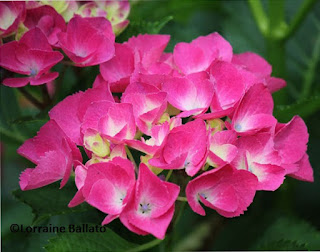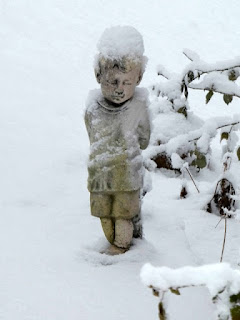TIME TO TRANSPLANT YOUR BIGLEAF HYDRANGEA
If
you're wondering when to transplant your bigleaf hydrangea (macrophylla), now is it. It's one of the
questions that often comes up during my lectures and talks as audiences realize
they need to move their plants.
Why would you want to move your plant?
Here are a couple of reasons: it has grown too big for its space and you always find yourself needing to cut it back which often results in fewer flowers. You either cut it at the wrong time or you damage it when you cut it. Or you realize that it is too exposed to winter weather and always dies back to the ground like the one in this photo
and maybe that wouldn't happen if it was in a different place. Or you never get around to it in time or whatever.
Why move it now?
Where would you move it?
Somewhere better! Try to find a place where your plant can grow to its intended full size with morning sun and afternoon shade: its ideal environment. But we don't live in an ideal world, do we? So do the best you can considering your options. Most importantly as we have learned if you live in a climate with finicky weather, do your best to site your plant with some kind of protection from winter, and desiccating winds. Look for places that have protective persistent winter foliage likeAlberta Adirondack
chairs around for the winter if necessary to block the weather. Take a moment
or two to examine your options before making that move.
How to transplant your hydrangeas?
With some help, I just moved about nine of my big leaf hydrangeas this past week from all over my yard. They were in the wrong places so we took an entire day to plant them where I think they (and I) will be happy.
Why would you want to move your plant?
Here are a couple of reasons: it has grown too big for its space and you always find yourself needing to cut it back which often results in fewer flowers. You either cut it at the wrong time or you damage it when you cut it. Or you realize that it is too exposed to winter weather and always dies back to the ground like the one in this photo
and maybe that wouldn't happen if it was in a different place. Or you never get around to it in time or whatever.
Why move it now?
Somewhere better! Try to find a place where your plant can grow to its intended full size with morning sun and afternoon shade: its ideal environment. But we don't live in an ideal world, do we? So do the best you can considering your options. Most importantly as we have learned if you live in a climate with finicky weather, do your best to site your plant with some kind of protection from winter, and desiccating winds. Look for places that have protective persistent winter foliage like
With some help, I just moved about nine of my big leaf hydrangeas this past week from all over my yard. They were in the wrong places so we took an entire day to plant them where I think they (and I) will be happy.
One of things to do is
make a hole deep enough to let water pool at the base of the plant. That way it
can sink in slowly to keep the roots moist, a critical success factor for a
transplanted hydrangea. Then wrap/lay that soaker hose (if you're using one)
around the base of the plant. Here's a photo
of one of the nine we moved before we laid the mulch.
Where is there more info on transplanting?
I devote an entire chapter
to this subject in my book, Success With Hydrangeas, A Gardener's Guide.
I write about moving all species of hydrangeas, not just the big leaf beauties.
If you have already purchased the book, Chapter Four has all the info you need.
If you would like to buy a signed
copy of my book, just go to www.lorraineballato.com
to place your order. Alternatively, your favorite bookseller can provide an
unsigned copy.
Here's to happy
hydrangeas, no matter where they are planted!






